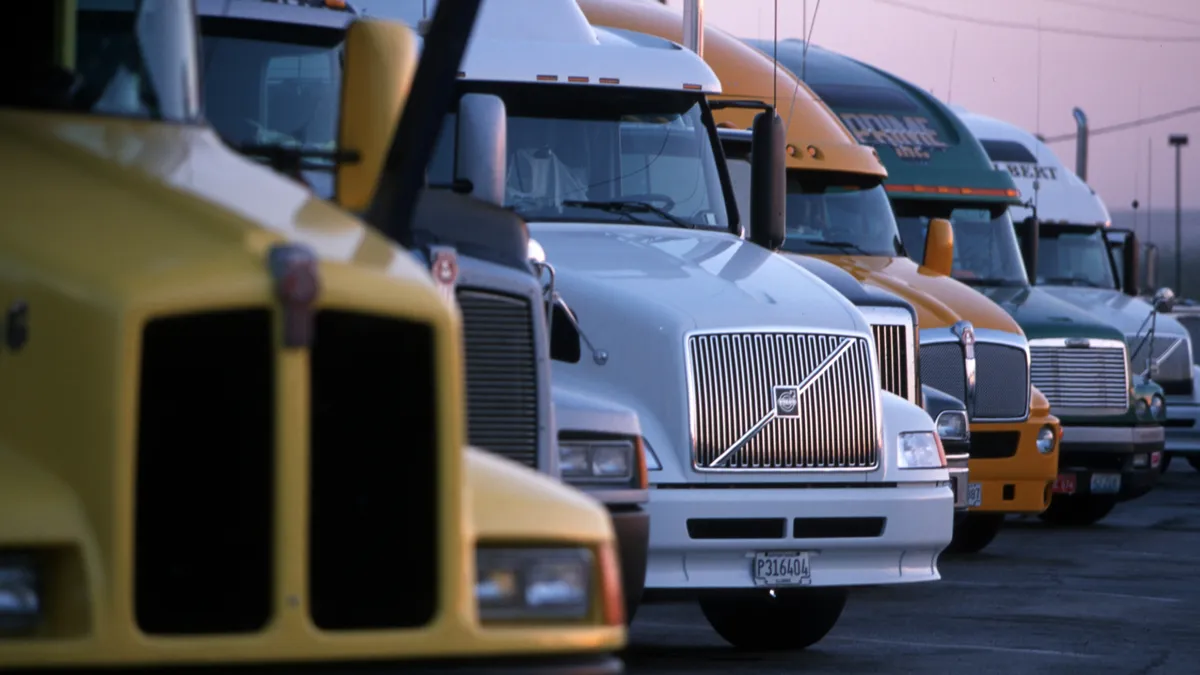Dive Brief:
- Semi-truck manufacturers have conspired to reduce the supply of trucks powered by traditional diesel engines — raising prices for buyers — as they try to boost sales of zero-emission electric vehicles, the Nebraska Attorney General and two co-plaintiffs alleged Tuesday in a federal lawsuit.
- The complaint targets the “nakedly anti-competitive” 2023 Clean Truck Partnership agreement between the California Air Resources Board and the makers of large, Class 8 heavy trucks used for interstate goods hauling. The suit says truck builders are seeking to increase their sales of Class 7 and 8 zero-emission trucks from 5% this year to 40% by 2032.
- The suit names four large truck makers — Daimler Truck, International Motors/Navistar, Paccar, Volvo Group — and the Truck & Engine Manufacturers Association as defendants. International Motors and Paccar declined to comment on the lawsuit, while Daimler and Volvo did not immediately respond to emails seeking comment. Jed Mandel, president of the truck and engine association, said in an email that “we believe the allegations are without merit and we will be defending ourselves vigorously.”
Dive Insight:
The manufacturers’ partnership with California “represents an industrywide commitment by companies to reduce their output of ICE vehicles and eliminate consumer choice, which will drive up prices for those same vehicles in Nebraska and elsewhere to subsidize the so-called ‘transition’ to zero emissions engines,” according to the complaint.
The plaintiffs allege that the manufacturers’ agreement with California regulators constitutes an “illegal horizontal conspiracy.” The Energy Marketers of America and Renewable Fuels Nebraska joined the state as co-plaintiffs.
Internal-combustion engines power 99.9% of all heavy-duty vehicle sales, with diesel engines accounting for 97% of these, according to the suit.
The manufacturers’ efforts to meet California’s emission targets “will all result in OEMs profiting at the expense of consumers, who in turn will have fewer options and will be forced to pay higher prices for their preferred ICE vehicles — while these vehicles are still available,” according to the lawsuit.
“When the supply of ICE vehicles runs dry, consumers will be left to purchase ZEVs they do not want — vehicles that come with a sticker price two or three times higher than comparable ICE vehicles.”
The suit, filed in Lincoln, Nebraska, follows dual lawsuits Nebraska and other states brought in May against U.S. and California regulators over plans for lower emissions standards for heavy trucks. Nebraska and 15 other states also sued the California Air Resources Board, beyond their suit against the Environmental Protection Agency.
California’s future emissions standards are more stringent than those promulgated by the EPA during the Biden administration. The state’s air resources board has called for 40% of truck tractor sales to be zero-emission by 2035.
“These manufacturers’ collusion will raise prices, reduce output, increase costs on Nebraskans, and is a classic antitrust violation,” Nebraska Attorney General Michael Hilgers said Tuesday in a press release.
Trucking industry executives have argued that a complete national transition from fossil fuels to electric motors won’t be possible due to unaffordable costs, infrastructure challenges and other issues.











